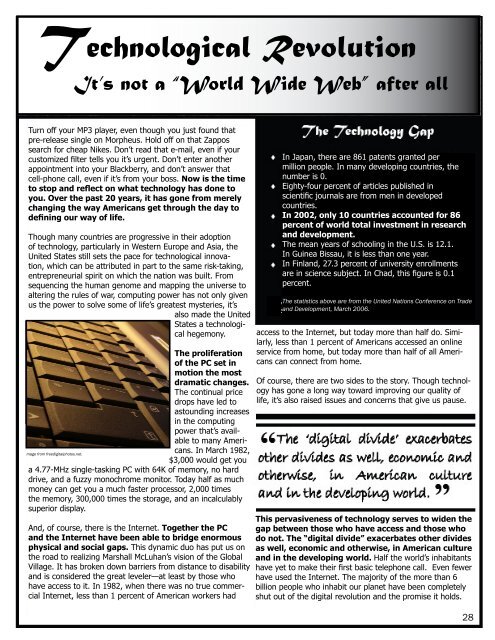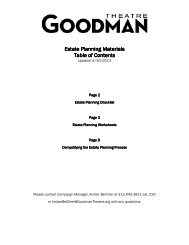A Christmas Carol Study Guide.indd - Goodman Theatre
A Christmas Carol Study Guide.indd - Goodman Theatre
A Christmas Carol Study Guide.indd - Goodman Theatre
Create successful ePaper yourself
Turn your PDF publications into a flip-book with our unique Google optimized e-Paper software.
Technological Revolution<br />
It’s not a “World Wide Web” after all<br />
Turn off your MP3 player, even though you just found that<br />
pre-release single on Morpheus. Hold off on that Zappos<br />
search for cheap Nikes. Don’t read that e-mail, even if your<br />
customized filter tells you it’s urgent. Don’t enter another<br />
appointment into your Blackberry, and don’t answer that<br />
cell-phone call, even if it’s from your boss. Now is the time<br />
to stop and reflect on what technology has done to<br />
you. Over the past 20 years, it has gone from merely<br />
changing the way Americans get through the day to<br />
defining our way of life.<br />
Though many countries are progressive in their adoption<br />
of technology, particularly in Western Europe and Asia, the<br />
United States still sets the pace for technological innovation,<br />
which can be attributed in part to the same risk-taking,<br />
entrepreneurial spirit on which the nation was built. From<br />
sequencing the human genome and mapping the universe to<br />
altering the rules of war, computing power has not only given<br />
us the power to solve some of life’s greatest mysteries, it’s<br />
also made the United<br />
States a technological<br />
hegemony.<br />
The proliferation<br />
of the PC set in<br />
motion the most<br />
dramatic changes.<br />
The continual price<br />
drops have led to<br />
astounding increases<br />
in the computing<br />
power that’s available<br />
to many Americans.<br />
In March 1982,<br />
mage from freedigitalphotos.net.<br />
$3,000 would get you<br />
a 4.77-MHz single-tasking PC with 64K of memory, no hard<br />
drive, and a fuzzy monochrome monitor. Today half as much<br />
money can get you a much faster processor, 2,000 times<br />
the memory, 300,000 times the storage, and an incalculably<br />
superior display.<br />
And, of course, there is the Internet. Together the PC<br />
and the Internet have been able to bridge enormous<br />
physical and social gaps. This dynamic duo has put us on<br />
the road to realizing Marshall McLuhan’s vision of the Global<br />
Village. It has broken down barriers from distance to disability<br />
and is considered the great leveler—at least by those who<br />
have access to it. In 1982, when there was no true commercial<br />
Internet, less than 1 percent of American workers had<br />
In Japan, there are 861 patents granted per<br />
million people. In many developing countries, the<br />
number is 0.<br />
Eighty-four percent of articles published in<br />
scientific journals are from men in developed<br />
countries.<br />
In 2002, only 10 countries accounted for 86<br />
percent of world total investment in research<br />
and development.<br />
The mean years of schooling in the U.S. is 12.1.<br />
In Guinea Bissau, it is less than one year.<br />
In Finland, 27.3 percent of university enrollments<br />
are in science subject. In Chad, this figure is 0.1<br />
percent.<br />
The statistics above are from the United Nations Conference on Trade<br />
and Development, March 2006.<br />
access to the Internet, but today more than half do. Similarly,<br />
less than 1 percent of Americans accessed an online<br />
service from home, but today more than half of all Americans<br />
can connect from home.<br />
Of course, there are two sides to the story. Though technology<br />
has gone a long way toward improving our quality of<br />
life, it’s also raised issues and concerns that give us pause.<br />
This pervasiveness of technology serves to widen the<br />
gap between those who have access and those who<br />
do not. The “digital divide” exacerbates other divides<br />
as well, economic and otherwise, in American culture<br />
and in the developing world. Half the world’s inhabitants<br />
have yet to make their first basic telephone call. Even fewer<br />
have used the Internet. The majority of the more than 6<br />
billion people who inhabit our planet have been completely<br />
shut out of the digital revolution and the promise it holds.<br />
28
















